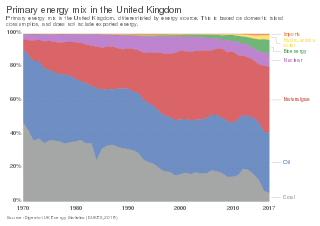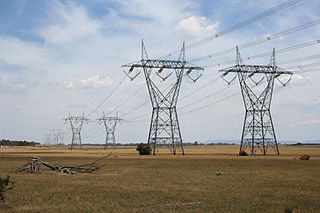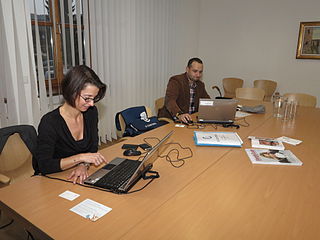| Agency overview | |
|---|---|
| Formed | 1 October 2008 |
| Superseding agencies |
|
| Jurisdiction | Tasmania, Australia |
| Minister responsible | |
| Parent department | Department of Treasury and Finance |
| Website | www |
The Office of the Tasmanian Economic Regulator, or OTTER is the Tasmanian Government agency responsible for various economic and energy supply regulating actions in the Australian state of Tasmania. OTTER is a member of the national Utility Regulators Forum, [1] and it has its headquarters in Hobart, Tasmania.
Under the Economic Regulator 2009 Act, the Tasmanian Economic Regulator replaced the former Government Prices Oversight Commission as the organization responsible for conducting investigations into the pricing of government agencies and local government bodies that are monopoly suppliers of goods and or services inside Tasmania. OTTER is also responsible for administering the Tasmanian Electricity Code and the Electricity Supply Industry Act 1995, and licensing energy suppliers in Tasmania. In 2000, through the Gas Act 2000 OTTER was given the responsibility to license gas suppliers and "facilitating the development of a gas supply industry in Tasmania". [2]
The board of the Tasmanian Economic Regulator is: [3]
| Name | Position | Term start | Term end |
|---|---|---|---|
| Glenn Appleyard | Chairman | ||
| Peter Hoult | Member | ||
| Alan Smart | |||
| Joe Dimasi | Regulator | 9 November 2015 |
In 2009, through the Economic Regulator Act 2009, The Tasmanian Economic Regulator replaced the Electricity Regulator, the Director of Gas, Government Prices Oversight Commission and the Water and Sewerage Economic Regulator, who had previously divided OTTER's duties between them.

Aurora Energy is a Tasmanian Government-owned electricity retailer in Tasmania, Australia.
The Renewables Obligation (RO) was designed to encourage generation of electricity from eligible renewable sources in the United Kingdom. It was introduced in April 2002, both in England and Wales and in Scotland albeit in a slightly different form: the Renewables Obligation (Scotland). The RO was later introduced in Northern Ireland in April 2005. In all cases, replacing the Non-Fossil Fuel Obligation which operated from 1990.
The Competition Commission was a non-departmental public body responsible for investigating mergers, markets and other enquiries related to regulated industries under competition law in the United Kingdom. It was a competition regulator under the Department for Business, Innovation and Skills (BIS). It was tasked with ensuring healthy competition between companies in the UK for the ultimate benefit of consumers and the economy.
The National Electricity Market (NEM) is an arrangement in Australia's electricity sector for the connection of the electricity transmission grids of the eastern and southern Australia states and territories to create a cross-state wholesale electricity market. The Australian Energy Market Commission develops and maintains the Australian National Electricity Rules (NER), which have the force of law in the states and territories participating in NEM. The Rules are enforced by the Australian Energy Regulator. The day-to-day management of NEM is performed by the Australian Energy Market Operator.

The Office of Gas and Electricity Markets (Ofgem), supporting the Gas and Electricity Markets Authority, is the government regulator for the electricity and downstream natural gas markets in Great Britain. It was formed by the merger of the Office of Electricity Regulation (OFFER) and Office of Gas Supply (Ofgas).

The Federal Network Agency is the German regulatory office for electricity, gas, telecommunications, post and railway markets. It is a federal agency of the Federal Ministry for Economic Affairs and Climate Action and headquartered in Bonn, Germany.
The Essential Services Commission of South Australia (ESCOSA) is the independent economic regulator established by the State Government of South Australia, to regulate prescribed essential utility services supplied by the electricity, gas, water, ports and rail industries.

The energy policy of the United Kingdom refers to the United Kingdom's efforts towards reducing energy intensity, reducing energy poverty, and maintaining energy supply reliability. The United Kingdom has had success in this, though energy intensity remains high. There is an ambitious goal to reduce carbon dioxide emissions in future years, but it is unclear whether the programmes in place are sufficient to achieve this objective. Regarding energy self-sufficiency, UK policy does not address this issue, other than to concede historic energy security is currently ceasing to exist.

British Gas is an energy and home services provider in the United Kingdom. It is the trading name of British Gas Services Limited and British Gas New Heating Limited, both subsidiaries of Centrica. Serving around ten million homes in the United Kingdom, British Gas was the biggest energy supplier in the country, until 2024 when it was overtaken by Octopus Energy as the UK's largest electricty supplier. It remains larger for gas. It is considered one of the Big Six dominating the gas and electricity market in the United Kingdom. Their lines are open from 8am to 5pm on weekdays, and 9am to 6pm on weekends.

The energy policy of Australia is subject to the regulatory and fiscal influence of all three levels of government in Australia, although only the State and Federal levels determine policy for primary industries such as coal. Federal policies for energy in Australia continue to support the coal mining and natural gas industries through subsidies for fossil fuel use and production. Australia is the 10th most coal-dependent country in the world. Coal and natural gas, along with oil-based products, are currently the primary sources of Australian energy usage and the coal industry produces over 30% of Australia's total greenhouse gas emissions. In 2018 Australia was the 8th highest emitter of greenhouse gases per capita in the world.

Energy in Victoria, Australia is generated using a number of fuels or technologies, including coal, natural gas and renewable energy sources. Brown coal, historically, was the main primary energy source for the generation of electricity in the state, accounting for about 85% of electricity generation in 2008. The amount of coal-fired power has decreased significantly with the closure in 2017 of the Hazelwood power station which supplied around 20% of Victoria's electricity, and to a lesser extent with the exit of Anglesea power station in 2015. Brown coal is one of the largest contributors to Australia's total domestic greenhouse gas emissions and a source of controversy for the country. Australia is one of the highest polluters of greenhouse gas per capita in the world.

E-Control (ECG) is the government regulator for electricity and natural gas markets in Austria. It was founded in 2001 on the basis of the Energy Liberalisation Act. E-Control's main duty as the independent regulatory authority is to "oversee and to control the Austrian gas and electricity market in the best interest of the consumer".
Ombudsmen in Australia are independent agencies who assist when a dispute arises between individuals and industry bodies or government agencies. Government ombudsman services are free to the public, like many other ombudsman and dispute resolution services, and are a means of resolving disputes outside of the court systems. Australia has an ombudsman assigned for each state; as well as an ombudsman for the Commonwealth of Australia. As laws differ between states just one process, or policy, cannot be used across the Commonwealth. All government bodies are within the jurisdiction of the ombudsman.
The Energy Commission, abbreviated ST, is a regulatory body for the energy industry in Peninsular Malaysia and Sabah. The commission was established under the Energy Commission Act 2001. Its key role to ensure that the energy industry is developed in an efficient manner so that Malaysia is ready to meet the new challenges of globalisation and liberalisation, particularly in the energy supply industry.
The Australian Energy Market Operator (AEMO) performs an array of gas and electricity market, operational, development and planning functions. It manages the National Electricity Market (NEM), the Wholesale Electricity Market (WA) (WEM) and the Victorian gas transmission network. AEMO also facilitates electricity and gas full retail contestability, overseeing these retail markets in eastern and southern Australia. It is additionally responsible for national transmission planning for electricity and the establishment of a Short Term Trading Market (STTM) for gas.

The Electricity Act 1989 provided for the privatisation of the electricity supply industry in Great Britain, by replacing the Central Electricity Generating Board in England and Wales and by restructuring the South of Scotland Electricity Board and the North of Scotland Hydro-Electric Board. The Act also established a licensing regime and a regulator for the industry called the Office of Electricity Regulation (OFFER), which has since become the Office of Gas and Electricity Markets (OFGEM).

The Gas Act 1986 created the framework for privatisation of the gas supply industry in Great Britain. This legislation would be replacing the British Gas Corporation with British Gas plc. The Act also established a licensing regime, a Gas Consumers’ Council, and a regulator for the industry called the Office of Gas Supply (OFGAS).

The Commission for Regulation of Utilities, formerly known as the Commission for Energy Regulation, is the Republic of Ireland's energy and water economic utility regulator.
Tasmania, as an advanced economy with a globally high standard of living, uses a great deal of energy. Distinctive features of energy use in Tasmania include the high fraction of hydroelectricity usage, the absence of coal-fired electrical generation, relatively light usage of natural gas, particularly for domestic use, and a wide use of domestic wood-burning stoves. Energy production through hydroelectricity has been politically contentious, and conflicts over Tasmanian hydroelectric projects were integral to the formation of Green parties in Australia and across the world.